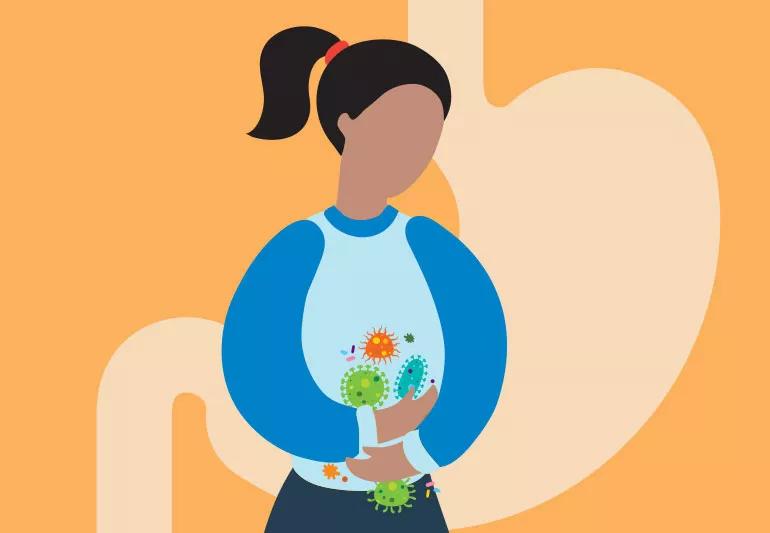You might have a condition called “post-infectious IBS”

Image content: This image is available to view online.
View image online (https://assets.clevelandclinic.org/transform/93dc5643-06ab-433f-a89a-51b7239c0641/stomachBug-907571532-770x553_jpg)
illustration of woman suffering from stomach bugs
If you’ve battled a gastrointestinal (GI) infection before, you know it’s not pleasant. But typically symptoms don’t last longer than a few days.
Advertisement
Cleveland Clinic is a non-profit academic medical center. Advertising on our site helps support our mission. We do not endorse non-Cleveland Clinic products or services. Policy
However, in some cases, the effects linger for weeks or months — even after a person is no longer vomiting or having severe symptoms after a bad bout with a virus or food poisoning. Some patients just can’t seem to get back to a normal GI rhythm or bowel function.
This condition is known as post-infectious irritable bowel syndrome (IBS). Gastroenterologist Brian Kirsh, MD, says post-infectious IBS is fairly common — and you can take steps to diagnose and treat it.
“Post-infectious IBS is a constellation of symptoms that resemble irritable bowel syndrome,” Dr. Kirsh says.
Symptoms are usually less severe than the original infection and may include:
“Over time people do tend to get better,” he says. “For most of them, this is not going to be lifelong IBS.”
The symptoms of post-infectious IBS develop after an infectious GI bug such as viral gastroenteritis or a bacterial infection like E. coli or Salmonella or even C. difficile. Patients may suspect this condition if they had a documented GI infection that resolved, but their digestive function won’t go back to normal. “That should tip them off that they should seek out help.”
Advertisement
Symptoms last for weeks, months or sometimes even a year. Why it tends to linger is unclear, Dr. Kirsh says.
“I’m not sure anyone can answer that,” he says. “There are things we just don’t know about why certain things cause irritability to certain parts of the body.”
One theory suggests that the original GI infection results in some change in a person’s normal bacterial count in their small bowel. “That may have some lingering impact on symptoms.”
Altering your diet can help relieve symptoms of post-infectious IBS. But keep in mind dietary remedies vary by patient.
For example, some people may find benefits from limiting wheat products. Others may need to stop eating dairy.
Research has shown that a low-FODMAP diet works well for most IBS symptoms. The diet recommends eliminating certain sugars that are difficult to digest. For example, a person on a low-FODMAP diet would avoid fruits such as apples, apricots, cherries and pears. Instead, they’d eat fruits like bananas, grapes and cantaloupe.
Overall, though, there’s no one-diet solution for everyone. So work with your doctor to find the best option for you.
If you have post-infectious IBS, your doctor may recommend probiotics. These supplements help repopulate the small intestine with healthy flora, Dr. Kirsh says.
A doctor might also prescribe antispasmodics or recommend antidiarrheal medications, many of which are available over the counter.
Depending on the severity of the case, a doctor might order a blood test. This test can help make sure a person with post-infectious IBS isn’t anemic and doesn’t have an elevated white blood cell count. Patients may also get their electrolytes tested to make sure they’re not dehydrated.
Depending on your symptoms, some patients may undergo further testing for celiac disease or receive an endoscopy or colonoscopy, too.
Provided you don’t have a chronic condition such as ulcerative colitis or Crohn’s disease, take this to heart: Post-infectious IBS shouldn’t last forever.
“Over time people do tend to get better,” Dr. Kirsh says. “For most of them, this is not going to be lifelong IBS.”
Advertisement

Sign up for our Health Essentials emails for expert guidance on nutrition, fitness, sleep, skin care and more.
Learn more about our editorial process.
Advertisement
Gallstones can block bile in your biliary system and lead to pain and discomfort
Peppermint oil, exercise and a belly massage can help, but for ongoing symptoms, you may need to talk to a healthcare provider
Opt for soft foods or liquids that are rich in protein, calories and vitamins
Delivered through an IV, options can include chemotherapy, immunotherapy or targeted therapy, or a combination
Irritable bowel syndrome has many signs, but lower abdominal pain, constipation and swelling may mean you should see a healthcare provider
Help your aching belly by staying hydrated, eating bland foods and avoiding certain foods
Hunger is the obvious cause, but food quality, and lack of protein and water are also key
Different symptoms call for different menus
Prioritize your health by managing stress, strengthening your social connections and getting quality sleep
Bolsters, blankets, pillows and blocks can offer extra support, stability and comfort
Allergies, postnasal drip, asthma or reflux could be to blame for a cough that won’t quit